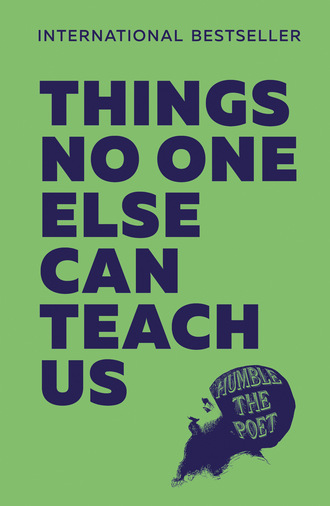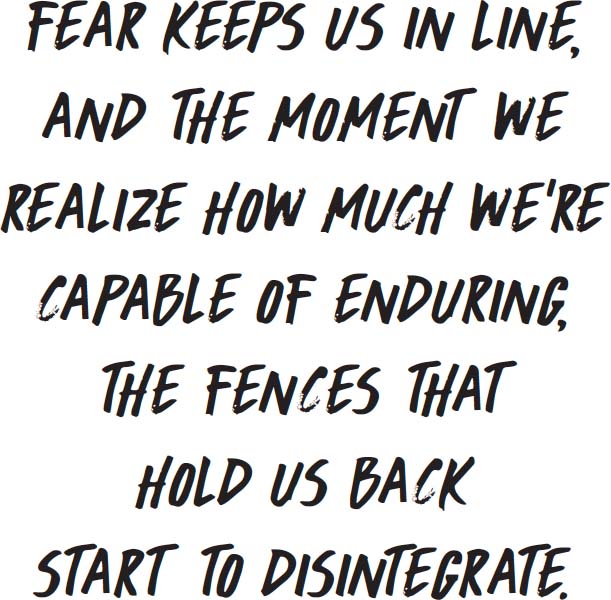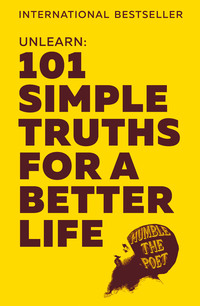
Полная версия
Things No One Else Can Teach Us
Roses are red, violets are blue
Listening to your parents
Means you don’t have to decide what to do
Sugar is sweet, syrup is sappy
Stick to the script
and keep everyone happy
Decisions are exhausting, and everybody likes to blame
So don’t rock the boat
And you won’t have to worry about them
Life is confusing, someone’s got to have the answers
And if they’re amusing, let’s make them our mentor
Let’s avoid the mirrors and allow others to paint our pictures
Of who we should be, without ever knowing who we are
The cost of being yourself, is being by yourself
And that’s a pretty penny I can’t afford
But staying in line has its cost
Keeping everyone else happy but ourselves
OPEN
What do you want to eat?
I don’t know, what do you want to eat?
I’m too tired to decide, just pick anything.
Making decisions takes energy, and it gets exhausting. There’s a term for this. It’s called decision fatigue, and it’s the reason that Steve Jobs, founder of Apple, always wore the same black turtleneck and blue jeans. It’s the reason Jeff Bezos, founder of Amazon, expects himself to make only three good decisions a day. These high-functioning individuals understand the importance of every decision they make and what it takes from them, so they reduce the number of decisions they make. Jobs did it by wearing the same clothes, to avoid that first decision of the day. Bezos understands that he can make only a finite number of good decisions each day, so he aims to make only three.
The rest of us have found our own hacks, like packing our lunch and laying out our clothes for the next day the night before. But in the bigger picture, with the big decisions in life, we’re either too overwhelmed with the options or constrained by the rules that society, culture, and friends and family have placed on us. The decisions we can’t make with confidence end up being made for us. That’s why so many of us are in school studying something we don’t like; getting an education is a realistic way to plug ourselves in to society and earn a living, allowing us to feel accepted by everyone else—and also to not embarrass our families.
That template isn’t just related to our careers; it’s related to our beliefs, values, and pursuits of happiness. Go to school, get a job, get married, have 2.5 kids, put them through school, get them married, have 2.5 grandkids, and retire, wait for death, while you reminisce about how horrible you were at math.
For those few of us who decide to go off-script, we’re leaving a zoo to enter the jungle. Sure, there’s an abundance of freedom when we choose to go against the template, but with that freedom comes new challenges. We have to trade feelings of safety and security for uncertainty, and we have to learn how to be out on our own. All the decisions that were previously made for us now rest solely on our shoulders.
And that’s fucking exhausting.
Many people give up and rejoin the templated life, where the path is so beaten, it’s paved with pretty lines and streetlights, which is much nicer than the dark dangerous uncertain jungle. There are fewer decisions to make and more guidelines for how it all works. Hit that benchmark at work by this age. Have kids now. Wait to travel the world.
Sticking to the script saves us from having to make a lot of tough decisions, but tough decisions still find us, often when life doesn’t go according to plan. The beauty in those tough decisions is that they teach us about ourselves.
We’ve been fed messages of how to know ourselves throughout our lives. The corny after-school specials always half-heartedly encouraged us to be ourselves. Social media found a way for us to sell an idea of our authentic selves. But the truth is, we have to go through bullshit in order to learn who we really are. When we get those moments, we realize one simple truth:
You can’t be yourself if you don’t know who you are.
So how do you know who you are? Everyone is a gooey batter of both nature and nurture, and every time shit hits the fan in our lives, we have an opportunity to get to know ourselves a bit better. It’s an exhausting experience, but it’s enriching.
We learn about ourselves through all of our interactions with the world, both good and bad. This is the reason your fourth-grade teacher taught you about rocks—not because it’s important to know the difference between sedimentary, igneous, and metamorphic rocks, but because a little dabble on a subject may awaken something in you to help you become the next Charles Darwin or Ross Geller.
So with everything you do, think about how it shapes who you are, and think about how who you are shapes your experience of everything you do.
The more you know yourself, the more you can live a life that feels right for you. The life you want to live will rarely be one-size-fits-all. Society, culture, and all the people you care about will try to make decisions for you, accidentally reinforcing their own desires for your conformity. But with conforming comes the kind of stress that can’t be meditated away ten minutes a day using an app on your phone.
The journey to know yourself better isn’t paved and doesn’t come with a map. That’s why you often feel like you’re lost or broken. Every moment when you’ve discovered something new about yourself likely happened the hard way, but it was worth it.
There’s nothing more important than being self-aware, and although it takes more brainpower than simply falling in line, it’ll save you so much more heartache, headache, and tension in the long run. That type of tension is what has us chasing fixes and distractions, avoiding the very inconvenient truth that stares us all in the mirror every day:
I’m not happy where I am right now.
Every promise broken, every heart-breaking moment, and even the random glimpses of hope can teach us about who we are, and what we want. Knowing these things will make all the difference in the life we have, the life we want, and how to bring the two together.

It was every dweeb’s dream—a message from a very pretty girl acknowledging the dweeb’s existence: “I know you’re the brains behind the operation.”
The operation she spoke about was comedy YouTube videos I put out along with a few friends called Harman The Hater. I wasn’t in the videos, but I directed, edited, and provided color commentary for them. I was a voice behind the camera, known only as Kman.
She noticed that, and she noticed me.
And she was gorgeous.
She had the most dangerous eyes, and she spoke with such assertiveness. We’d talk online, and then on the phone. After one long conversation lasting the entire night, we met at 6 a.m. on a dare.
Our second date was at a Christmas party thrown by the elementary school where I was a teacher. She introduced herself to everyone as my fiancée; she was fearless and bold, like Angelina Jolie’s character in any movie she’s ever done.
By the third date, we had already planned a trip together: Thailand for three weeks. It didn’t matter whether either of us was uncomfortable with the idea; we wouldn’t dare admit it. We fed each other’s rebellious sides. Our families weren’t from the same country, language, or faith. Every decision we made had to be an adventure.
She probably got fired from four jobs while we were together, most often for talking back to her superiors. She was very entitled, but stood up for herself, and every time she lost a job, she’d find another—something more interesting and exciting.
For a while, she was working at a small cafe in Toronto that was a front for the illegal gambling machines kept in the back. She was paid cash to serve coffee, but mainly to keep an eye on the special clientele and watch out for cops. She fawned over work stories of simply sitting by the window, reading the newspaper, drinking a cappuccino, kissed by the sun, as regulars greeted her and then headed to the back room to lose money.
We explored the world, life, and ourselves together. She was the first person to tell me “the world needs to hear your ideas,” but at the same time, she saw my infancy celebrity as annoying. She didn’t want to wait an hour after my shows as I took pictures with fans; it bored her and made her restless.
Our relationship worked when our priorities matched, and that usually centered around our shared desire for adventure, but also the stability of having each other. Our phone conversations lasted for hours, even after a year of dating, because we were both curious about ideas and subjects beyond ourselves.
When I spoke to her in person, she stared at me with those dangerous eyes, scanning my face, twitching her little rodent nose, as if trying to interpret abstract art. She told me I had the most beautiful forehead and that no other girls were allowed to see it.
When we fought, it was intense. She was the first woman I’d ever met who said things she didn’t mean when she argued.
“Oh, you fucked up now! This is over! You fucked this up so bad, you’re going to regret this for the rest of your life!”
And I would sit there, with tears filling my eyes, trying to figure out how I’d fucked it up so bad. Hours later she would console me and tell me she didn’t mean it.
Except the times she did.
People would compliment me on her, as if she were a trophy wife, and I remember not knowing how to reply when someone told me how beautiful she was.
Thanks, she gets it from me.
Thanks, but I think I’m better looking.
Umm … thanks.
Obviously! That’s why I’m with her!
One dude even told me that he was proud to see a fellow Singh[1] with such an attractive woman, because it was a “good look.”
Although I dismissed a lot of the comments, they affected me, and I began to think I was with someone who was out of my league, and I couldn’t do better. Her beauty was intimidating, and it magnified my insecurities.
As our arguments got harder and my list of insecurities got longer, I felt the relationship going downhill. She always noticed me, until she didn’t, and the moments she didn’t (often on purpose), I would boil in frustration.
Our first breakup broke me.
I stayed in bed for two days, trying to figure out how I could continue existing without her in my life. She was all I knew, and the best part about me. When she left, so did the life I dreamed about, along with my self-worth and any enthusiasm I held for the future. I cried and blamed others for creating a wedge between us. I refused to speak to anyone, while simultaneously soaking up any pity that came my way. News of our breakup spread quickly through the school where I worked, including my pity party reaction to it.
When I got back to work, a colleague sat me down and gave me The Chat: “I’m divorced with two kids, and watching my marriage crumble was the hardest thing I ever had to endure. I’m not the only person at this school who’s gone through hardships, and neither are you. But one thing we have to remember is, the world doesn’t stop for our tragedies; it keeps moving, and we have to keep moving with it. Stop handling your tragedies like a child, and deal with them like an adult. Adults show up for work, children stay in bed.”
Those words didn’t affect me immediately, but they were a sleeper cell. It wasn’t until after another on-again, off-again drama and we broke up a final time that I started to accept what it meant to “deal with” this.
She had left Toronto to teach English in South Korea, and a few weeks later she messaged me to say things were too heavy and she didn’t want to be in a relationship anymore. I didn’t crumble in heartbreak like I had so many times in the past. I went to work and had a productive day.
It wasn’t easy, but it was necessary. I channeled my frustration over her into my work and let the pain live for a purpose beyond me.
There were still tears, hard nights, and the urge to send her messages, but I didn’t let those things affect my day-to-day life this time. I handled it like an adult.
If you had you asked me, even six months before, to think about losing her, I would have contemplated suicide. I had no faith in myself or my ability to move past any heartbreak. What changed when we broke up for the last time? Maybe it was a little of my seeing it coming, a little bit of my understanding that I couldn’t do much since she was halfway around the world, and a little bit of my being relieved that the rollercoaster ride was over.
I realized what I was capable of surviving. I’d already experienced so much pain in our numerous other breakups, and I made it through because I took my colleague’s advice to take things one day at a time. None of us knows how strong we are until being strong is the only option we have left. We spend so much of our lives avoiding discomfort that we don’t realize that in those uncomfortable situations, our best selves emerge.
I had feared for months that I would lose her, but that vision of how bad the breakup would feel existed only in my head. The reality was different. Our worst fears are rarely realized, and even when they are, we’re still standing.
Just as there’s a day following the good news, there’s always a day after the bad news. As my colleague said, “The world doesn’t stop for our tragedies,” and neither should we. So, when you’ve cried all you can cry and complained all you can complain, remember there’s going to be another day after all of that, and you just have to keep going to see it.
I’d love to tell you that was the end of our story, but with her, there may never be an end. As I got more popular, ironically, I became more of a global citizen than she did, and our paths crossed a few times. We agreed to keep each other company in Bali, I crashed on her couch in Birmingham, she brought friends to watch my show in Dubai; and when I was living in Los Angeles and becoming more of a mainstream character in the world of entertainment, she called me to say, “What the fuck are you doing? You’re above this, your purpose is more important than being famous.”
She was still loving me from afar.
Years after this love story ran its course,[2] the lesson that the world doesn’t stop because of our tragedies has saved me. This painful experience showed me that I’m much tougher than I thought and that I should give myself more credit than I do. I have a feeling that applies to you as well.
We can survive a lot. Surviving things in the short term may be very unpleasant, but in the long term, we will gain in character, strength, and wisdom. I’ve kept that message with me as I face new challenges in life, knowing that no matter what happens, I’ll be able to claw myself out of the holes and come out stronger.
Fear keeps us in line, and the moment we realize how much we’re capable of enduring, the fences that hold us back start to disintegrate.
The freedom that comes with moving despite the fear is a liberation we would all benefit from.
I’m grateful she and I are on healthy-ish terms; it couldn’t have been easy for her to end things when she did, and how she did, and it must have been just as difficult for her to try to come back.
Let’s stop avoiding painful situations, because that’s where all the growth lives.
After our relationship had faded, and much to the chagrin of her new beaus, she still talked about me and shared my work with people in her life. Girls in my life told me that I was still in love with her, and I laughed and simply said, “It doesn’t matter if I am; love isn’t enough to put up with her shit.” Sometimes it’s best to love someone from afar.
Her last message to me was, “Let’s revisit this when you’re seventy and no other girl wants you.” Look out for us—one day we’ll be a rebellious cute old couple sitting at the park, up to no good.

Конец ознакомительного фрагмента.
Текст предоставлен ООО «ЛитРес».
Прочитайте эту книгу целиком, купив полную легальную версию на ЛитРес.
Безопасно оплатить книгу можно банковской картой Visa, MasterCard, Maestro, со счета мобильного телефона, с платежного терминала, в салоне МТС или Связной, через PayPal, WebMoney, Яндекс.Деньги, QIWI Кошелек, бонусными картами или другим удобным Вам способом.


